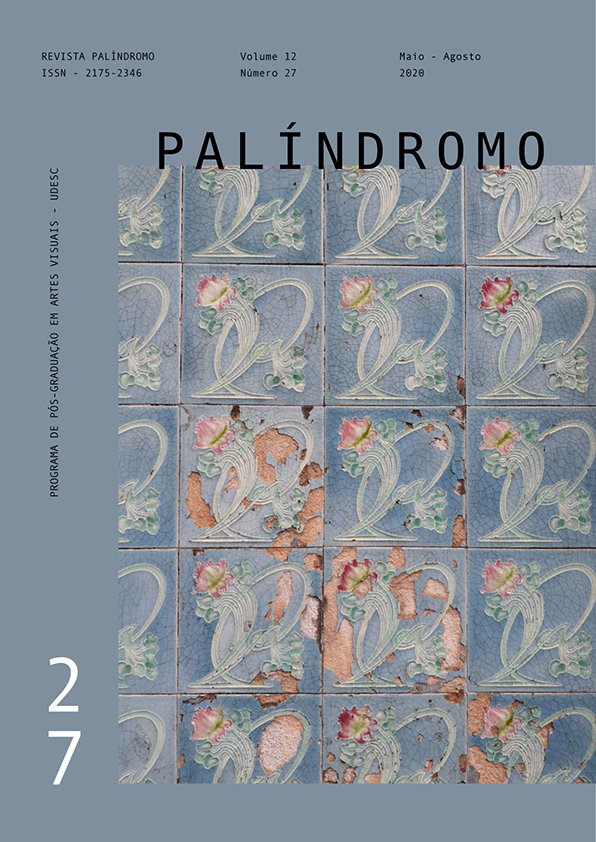O Ornamento no pensamento de John Ruskin
DOI:
https://doi.org/10.5965/2175234612272020120Palavras-chave:
John Ruskin, Arquitetura, Ornamento, ImperfeiçãoResumo
O presente artigo pretende evidenciar e perceber a presença do ornamento vivo na formação do pensamento estético de John Ruskin. Suas reflexões sobre o trabalho expressivo na arquitetura, manifestado sobretudo em sua ornamentação, serão tomadas sob o conceito do fantástico paradoxo da imperfeição, que evidencia a vitalidade e o prazer do trabalhador em sua prática oficinal. Tal manifestação de vida e de felicidade somente poderia ser alcançada pela comunhão entre o trabalho manual e intelectual de seus artesãos.
Downloads
Referências
AMARAL, Claudio. John Ruskin e a Natureza do Gótico. Arquitextos, nº 235, ano 20, 2019.
CLARK, Kenneth. The Gothic Revival: an Essay in the History of Taste. London: Constable, 1950.
CLARK, Kenneth. Ruskin Today. Baltimore: Penguin Books, 1967.
FRAMPTON, Kenneth. História crítica da arquitetura moderna. Tradução de Jefferson Luiz Camargo e Marcelo Brandão Cipolla. São Paulo: Martins Fontes, 2015.
LANDOW, George. Aesthetic and Critical Theory of John Ruskin. Princeton: Princeton University Press, 1971.
LIRA, José Tavares Correia. Ruskin e o trabalho da arquitetura. Risco: Revista de Pesquisa em Arquitetura e Urbanismo, Universidade de São Paulo, São Paulo, v. 4, n. 2, p. 77-86, 2006.
RUSKIN, John. A economia política da arte. Tradução: Rafael Cardoso. Rio de Janeiro: Record, 2004.
RUSKIN, John. As pedras de Veneza. Tradução: Luís Eduardo de Lima Brandão. São Paulo: Martins Fontes, 1992.
RUSKIN, John. The Seven Lamps of Architecture. London: Library Edition, works, v. viii, 1903. Disponível em: https://bit.ly/2nVdW45.
RUSKIN, John. The Stones of Venice. London: Library Edition, v. I, works, v. ix, 1903 Disponível em: https://bit.ly/2nVdW45.
RUSKIN, John. The Stones of Venice. London: Library Edition, v. II, works, v. x, 1904 Disponível em: https://bit.ly/2nVdW45.
RUSKIN, John. The Stones of Venice. London: Library Edition, v. III, works, v. xi, 1904 Disponível em: https://bit.ly/2nVdW45.
RUSKIN, John. Two Lectures on the Political Economy of Art (1857-1880). In: RUSKIN, John. A Joy for ever. London: Library Edition, part I, works, v. xvi, 1905, p. 15-174. Disponível em: https://bit.ly/2nVdW45.
RUSKIN, John. Lectures on Architecture and Painting. Adenda aos capítulos I e II. London: Library Edition, part I, works, v. xii, 1904, p. 81-101. Disponível em: https://bit.ly/2nVdW45.
RUSKIN, John. Modern Manufacture and Design (1859). In: RUSKIN, John. The Two Paths. London: Library Edition, lecture III, works, v. xvi, 1905, p. 319-345. Disponível em: https://bit.ly/2nVdW45.
RUSKIN, John. Influence of Imagination in Architecture (1857). In: RUSKIN, John. The Two Paths. London: Library Edition, lecture IV, works, v. xvi, 1905, p. 346 -374. Disponível em: https://bit.ly/2nVdW45.
RUSKIN, John. Unto this Last (1860). London: Library Edition, part I, works, v. xvii, 1905, p. 5-118. Disponível em: https://bit.ly/2nVdW45.
TOWNSEND, Francis G. Ruskin and the Landscape Feeling: a critical analysis of his thought during the crucial years of his life, 1843-56. Urbana: University of Illinois, 1951.
Downloads
Publicado
Como Citar
Edição
Seção
Licença
Copyright (c) 2020 Eliane Baader de Lima

Este trabalho está licenciado sob uma licença Creative Commons Attribution 4.0 International License.
DECLARAÇÃO DE DIREITOS AUTORAIS
a. Os artigos publicados pela revista são de uso gratuito, destinados a aplicações acadêmicas e não comerciais. Todos os direitos autorais são atribuídos à revista. Os artigos cujos autores são identificados representam a expressão do ponto de vista de seus autores e não a posição oficial da Revista Palíndromo. O (s) autor (es) compromete-se sempre que publicar material referente ao artigo publicado no Palíndromo mencionar esta publicação da seguinte forma:
Este artigo foi publicado originalmente pela revista Palíndromo em seu volume (coloque o volume), número (coloque o número) no ano de (coloque o ano) e pode ser acessado em: http://www.revistas.udesc.br/index.php/palindromo
b. Plágio, em todas as suas formas, constitui um comportamento antiético de publicação e é inaceitável. A revista Palíndromo utiliza o software iThenticate de controle de similaridade


